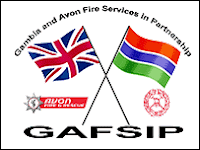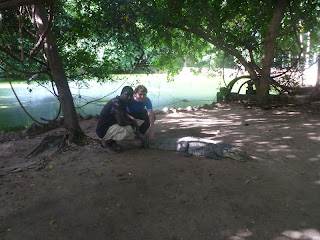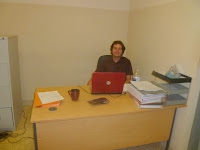Last weekend I boarded a ferry and ventured into new territory, the other side of the River Gambia... The journey was an experience in itself, with the ferry ride across the river a great chance to take in the beautiful sea. I then boarded a minibus to take me further eastwards, which would have been another chance to take in more scenery, had it not been for all the bodies around me – the minibus was filled up to the brim, with about 20 people in a vehicle meant for 10. At least I got a closer view of the various fashion styles in The Gambia!
 After a journey of about 3 hours I finally arrived in Kerewan, one of the main towns on the north side of the country. I spent a great time with some of the VSO and Peace Corps volunteers there, with whom we had a lovely bonfire by a nearby pier. Lots of happy memories! Waking up with sore heads, we bundled onto another minibus (this time not so packed) to head for Farafenni, a market town by the border with Senegal. I got to see my first “lumo”, an open-air market filled with hundreds of market sellers. The travelling experience was completed with a horse and cart ride back to the town centre.
After a journey of about 3 hours I finally arrived in Kerewan, one of the main towns on the north side of the country. I spent a great time with some of the VSO and Peace Corps volunteers there, with whom we had a lovely bonfire by a nearby pier. Lots of happy memories! Waking up with sore heads, we bundled onto another minibus (this time not so packed) to head for Farafenni, a market town by the border with Senegal. I got to see my first “lumo”, an open-air market filled with hundreds of market sellers. The travelling experience was completed with a horse and cart ride back to the town centre. I had a great time and saw many beautiful things – I love going to the Gambian countryside, it’s so peaceful, the people are friendlier and the surroundings look beautiful. To see a few of the photos I took please feel welcome to see my Picasa photo gallery.
A Gambian Woman on the World Stage - this week a Gambian made the international news. No mean feat for the smallest country in Africa, with a population of only 1.5. million! Fatou Bensoud has been appointed the new Chief Prosecutor for the International Criminal Court, a big role considering all the high profile cases that are coming our way in 2012. Many commentators seem to approve of an African becoming the next Chief Prosecutor, considering all the African ex-leaders and politicians that are likely to be tried in the Hague in the future.
The Gambian Government has been pushing for more women to take higher roles in society, and has been encouraging more girls to stay on at school. Hopefully Fatou Bensoud will be another role model for young Gambian women, encouraging them to aspire for more. You can read reports on this story on the BBC and the France 24 websites.
I’m soon going to be heading back to the UK for Christmas. However, I’ll continue to write up my musings on The Gambia though, so keep your eyes peeled for future postings! There should also be another film on the way too... For now though, many best wishes from a hot and sunny West Africa,
I’m soon going to be heading back to the UK for Christmas. However, I’ll continue to write up my musings on The Gambia though, so keep your eyes peeled for future postings! There should also be another film on the way too... For now though, many best wishes from a hot and sunny West Africa,
Robert




















































